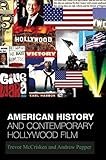American History and Contemporary Hollywood Film / Trevor McCrisken, Andrew Pepper.
Material type: TextPublisher: Edinburgh : Edinburgh University Press, [2022]Copyright date: ©2005Description: 1 online resource (240 p.)Content type:
TextPublisher: Edinburgh : Edinburgh University Press, [2022]Copyright date: ©2005Description: 1 online resource (240 p.)Content type: - 9780748614899
- 9781474470841
- online - DeGruyter
| Item type | Current library | Call number | URL | Status | Notes | Barcode | |
|---|---|---|---|---|---|---|---|
 eBook
eBook
|
Biblioteca "Angelicum" Pont. Univ. S.Tommaso d'Aquino Nuvola online | online - DeGruyter (Browse shelf(Opens below)) | Online access | Not for loan (Accesso limitato) | Accesso per gli utenti autorizzati / Access for authorized users | (dgr)9781474470841 |
Browsing Biblioteca "Angelicum" Pont. Univ. S.Tommaso d'Aquino shelves, Shelving location: Nuvola online Close shelf browser (Hides shelf browser)

|

|

|

|

|

|

|
||
| online - DeGruyter Ranching & Enterprise in Eastern Botswana : A Case Study of Black & WhiteFarmers / | online - DeGruyter Asante Identities : History and Modernity in an African Village, 1850-1950 / | online - DeGruyter Scottish Local Government / | online - DeGruyter American History and Contemporary Hollywood Film / | online - DeGruyter Corpus Linguistics / | online - DeGruyter Get Set for Sociology / | online - DeGruyter Italo Calvino / |
Frontmatter -- Contents -- Acknowledgments -- Preface -- Introduction -- Chapter 1. Lessons from Hollywood's American revolution -- Chapter 2 Rattling the chains of history: Steven Spielberg's amistad and 'telling everyone's story' -- Chapter 3 Hollywood's civil war dilemma: to imagine or unravel the nation? -- Chapter 4 Saving the good war: Hollywood and world war II in the post-cold war world -- Chapter 5 Oliver Stone and the decade of trauma -- Chapter 6 From civil rights to black nationalism: Hollywood v. black America? -- Chapter 7 Hollywood's post-cold war history: the 'righteousness' of American interventionism -- Selected bibliography -- Index
restricted access online access with authorization star
http://purl.org/coar/access_right/c_16ec
Hollywood has a growing fascination with America's past. This is evidenced in the release of a rash of films of this genre in the past 25 years. This book offers an analysis of how and why contemporary Hollywood films have sought to mediate American history. It is the first book to explore, comprehensively, the post-Cold War period of film-making, and to consider whether or how far contemporary films have begun to unravel the unifying myths of earlier films and periods. It also considers why such films are becoming increasingly integral to the ambitions of a globally-focused American film industry.The relationship between film and history - the way in which film mediates history and vice versa - is a complex one. In this book, the authors work from two main assumptions. First, that films revision events to challenge or, perhaps more typically, to reaffirm traditional historical interpretations. Second, that this process can only be understood in the context of contemporary debates about identity politics, America's role in world affairs, and the globalisation of the American film business.The book is structured by historical periods and includes chapters on:The American Revolution (Revolution, The Patriot)Slavery (Roots, Amistad)The Civil War (Gettysburg,Glory,Ride with the Devil, Cold Mountain)World War II (Saving Private Ryan, Thin Red Line, Pearl Harbor)Oliver Stone and the Decade of Trauma (Platoon, Born on the Fourth of July, Heaven and Earth, Nixon)Civil Rights and Black Nationalism (Panther, Mississippi Burning, The Hurricane, Malcolm X, Ali)American Interventionism (Three Kings, Black Hawk Down)Key FeaturesUnique: the only book to provide comprehensive analysis of the relationship between film and American history in the post-Cold War eraTopical: explores the relationship between cinema, representation and national identityAccessible: analyses a broad range of popular, mainstream films which engage with well-known historical eventsUses cultural theory to help consider the complex relationship between film and historyEngages with the contentious issue of the extent to which film distorts/ revisions historical 'truths'
Mode of access: Internet via World Wide Web.
In English.
Description based on online resource; title from PDF title page (publisher's Web site, viewed 29. Jun 2022)


